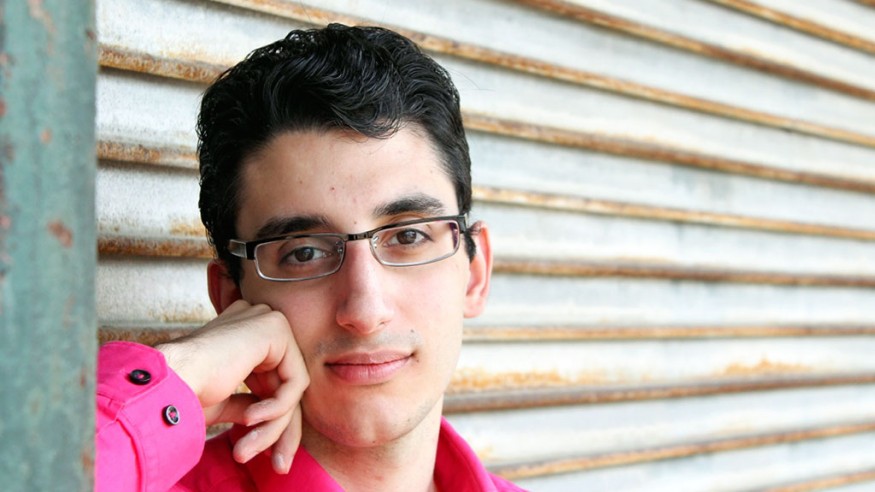
OWU Student Experiences Success in New York
Ryan Haddad ’15. (Photo by Laura Nikas)
We often say that OWU changes lives, and one Ohio Wesleyan student agrees wholeheartedly. Ryan Haddad ’15 first made contact with performance artist Tim Miller when Miller was in residence at the University in February, 2013. The week-long workshop culminated in a student performance titled “Breathing Underwater.” In the workshop, Haddad says, “[the student participants] connected profoundly, even though we already were friends.” Various prompts encouraged self-revelation as the group created individual and group stories. Haddad, who has cerebral palsy and uses a walker, says, “I did something about my disability and being an actor. Tim told me to go write it down.”
Next, Haddad says, “We had to incorporate people into a performance piece. We couldn’t tell the others what it was about. I continued with the emphasis on disability, and I took my first steps on stage without my walker. I was in the moment, but the others were amazed.”
Many who attended the end-of-workshop performance says it was the most moving theatrical experience of their lives, Haddad says. “People really connected to our pieces—and then Tim told me he’d been invited to do a public performance at the New Museum, and he thought I should be part of it.”
Miller’s Exhibit Q: Queer Bodies, an ensemble-devised program, was the culmination of another week-long residency put together by Miller and a group of “queer-identified and queer-allied students, performers, artists, scholars, and other interested non-academics” that explores the explosive boundaries between “our ‘queered’ bodies and society…our narratives and our politics … our private selves and public view.”
A recent graduate, Jordan Ahmed ’13, who had connected with Tim at Ohio Wesleyan, also participated in the New York workshop.
“Tim said he thought it would be great for us to connect with artists in New York,” Haddad said. “We couldn’t have gone with without OWU’s providing us with a grant for a Student Individualized Project. The grant allowed us to stay in a hotel because not every apartment in New York is accessible, and the subway is a nightmare.”
New York was magical, Haddad says, but somewhat frightening at first. “In the workshop, Jordan and I were surrounded by MFAs and PhDs or working professionals. The caliber of these people was a little intimidating,” he says.
“The workshop was somewhat similar to the one at OWU, Haddad continues, “but went a little faster. On Day One, we had to create a two-minute piece of six or seven sentences with a group of four people. I broke the rules a little bit with a few more sentences, gave instructions to my group, and improvised completely. The reaction was overwhelming. Once again, Tim told me to go home and write it down.”
His performance piece began with a moment of agency in preschool, when he confronted authority’s expectations about his disability and, though too young to realize it at the time, his sexuality. In a few short minutes, he brought the audience from the past into the future, claiming that what he knew was rightly his as a little boy would one day become his reality.
The piece, which focused on marriage, became the finale of the public performance. Because the performance took place during the week that the Defense of Marriage Act and Proposition 8 were struck down, Miller told Haddad it “wrapped everything up in a wonderful way.”
Feedback on Haddad’s performance piece was extremely positive, with Miller saying that Haddad should turn it into a full-length performance—that his voice was needed in both the gay and disability communities.
Haddad had planned to go to New York next year as part of the New York Arts Program, but was wavering because he thought it might be too difficult to navigate and he wasn’t sure of the type of reception he would encounter as a disabled performer. “I now have the confidence to do it,” he says. “I can’t not do it. When I got there, I knew Jordan and that was all, but afterward, we’d become part of a community of 27 people who were virtually strangers in the beginning, but now are this wonderful family. It was worth the entire experience. Even my parents are more comfortable with the idea of my being there. I know that I will live there during my 20s.”
